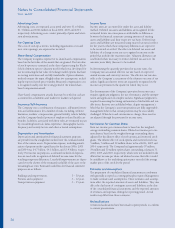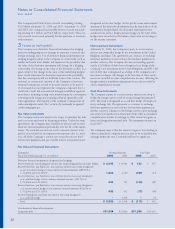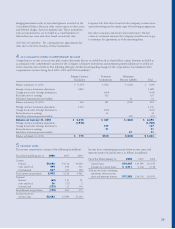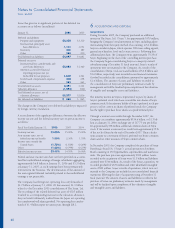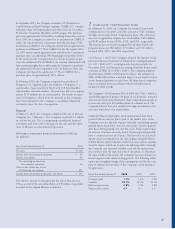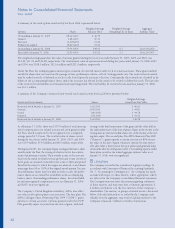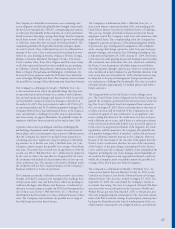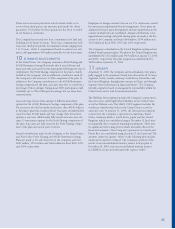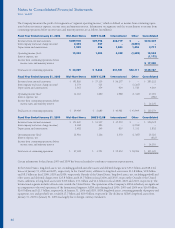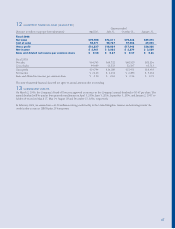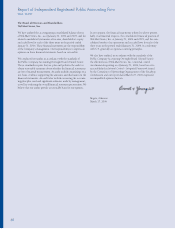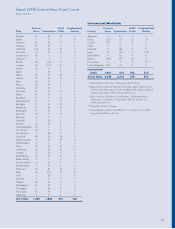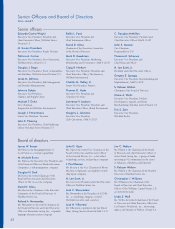Walmart 2006 Annual Report Download - page 45
Download and view the complete annual report
Please find page 45 of the 2006 Walmart annual report below. You can navigate through the pages in the report by either clicking on the pages listed below, or by using the keyword search tool below to find specific information within the annual report.
43
The Company is a defendant in numerous cases containing class-
action allegations in which the plaintiffs have brought claims under
the Fair Labor Standards Act (“FLSA”), corresponding state statutes,
or other laws. The plaintiffs in these lawsuits are current and former
hourly associates who allege, among other things, that the Company
forced them to work “off the clock,” or failed to provide work breaks,
or otherwise claim they were not paid for work performed. The
complaints generally seek unspecifi ed monetary damages, injunc-
tive relief, or both. Class certifi cation has yet to be addressed in a
majority of the cases. Class certifi cation has been denied or over-
turned in cases pending in Arizona, Arkansas, Florida, Georgia,
Indiana, Louisiana, Maryland, Michigan, Nevada, New Jersey,
North Carolina, Ohio, Texas, West Virginia and Wisconsin. Some
or all of the requested classes have been certifi ed in cases pending
in California, Colorado, Massachusetts, Minnesota, Missouri, New
Mexico, Oregon, Pennsylvania and Washington. Conditional certi-
fi cations for notice purposes under the FLSA have been allowed in
cases in Georgia, Michigan and Texas. The Company cannot estimate
the possible loss or range of loss which may arise from these lawsuits.
The Company is a defendant in Savaglio v. Wal-Mart Stores, Inc.,
a class-action lawsuit in which the plaintiffs allege that they were
not provided meal and rest breaks in accordance with California
law, and seek monetary damages and injunctive relief. A jury trial
on the plaintiffs’ claims for monetary damages concluded on
December 22, 2005. The jury returned a verdict of $57,216,673
in statutory penalties and $115 million in punitive damages. The
Company believes that it has substantial defenses to the claims at
issue, and intends to challenge the verdict in post-trial motions
and, if necessary, on appeal. Meanwhile, the plaintiffs’ claims for
injunctive relief have been tentatively set for trial in June 2006.
A putative class action is pending in California challenging the
methodology of payments made under various Associate incentive
bonus plans, and a second putative class action in California asserts
that the Company has omitted to include bonus payments in
calculating associates’ regular rate of pay for purposes of determin-
ing overtime. As to the fi rst case (Cruz v. Wal-Mart Stores, Inc.), the
Company cannot estimate the possible loss or range of loss which
may arise. The parties have entered into an agreement to settle the
second case (Fries v. Wal-Mart Stores, Inc.), which must be approved
by the court in order to become effective. If approved by the court,
the settlement will include all class members who do not opt out
of the settlement class. The amount to be paid by Wal-Mart under
the settlement will not have a material impact on the Company’s
fi nancial condition or results of operations.
The Company is currently a defendant in fi ve putative class actions
brought on behalf of assistant store managers who challenge their
exempt status under state and federal laws, which are pending in
California, Michigan, New Mexico and Tennessee. Conditional cer-
tifi cation for notice purposes under the FLSA has been granted in
one of these cases (Comer v. Wal-Mart Stores, Inc.). Otherwise, no
determination has been made as to class certifi cation in any of these
cases. The Company cannot estimate the possible loss or range of
loss which may arise from these lawsuits.
The Company is a defendant in Dukes v. Wal-Mart Stores, Inc., a
class-action lawsuit commenced in June 2001 and pending in the
United States District Court for the Northern District of California.
The case was brought on behalf of all past and present female
employees in all of the Company’s retail stores and warehouse clubs
in the United States. The complaint alleges that the Company has
engaged in a pattern and practice of discriminating against women
in promotions, pay, training and job assignments. The complaint
seeks, among other things, injunctive relief, front pay, back pay,
punitive damages, and attorneys’ fees. Following a hearing on class
certifi cation on September 24, 2003, on June 21, 2004, the District
Court issued an order granting in part and denying in part the plain-
tiffs’ motion for class certifi cation. The class, which was certifi ed by
the District Court for purposes of liability, injunctive and declara-
tory relief, punitive damages, and lost pay, subject to certain excep-
tions, includes all women employed at any Wal-Mart domestic retail
store at any time since December 26, 1998, who have been or may
be subjected to the pay and management track promotions poli-
cies and practices challenged by the plaintiffs. The class as certifi ed
currently includes approximately 1.6 million present and former
female associates.
The Company believes that the District Court’s ruling is incor-
rect. The United States Court of Appeals for the Ninth Circuit has
granted the Company’s petition for discretionary review of the rul-
ing. The Court of Appeals heard oral argument from counsel in
the case on August 8, 2005. There is no indication at this time as
to when a decision will be rendered. If the Company is not suc-
cessful in its appeal of class certifi cation, or an appellate court
issues a ruling that allows for the certifi cation of a class or classes
with a different size or scope, and if there is a subsequent adverse
verdict on the merits from which there is no successful appeal, or
in the event of a negotiated settlement of the litigation, the result-
ing liability could be material to the Company. The plaintiffs also
seek punitive damages which, if awarded, could result in the pay-
ment of additional amounts material to the Company. However,
because of the uncertainty of the outcome of the appeal from the
District Court’s certifi cation decision, because of the uncertainty
of the balance of the proceedings contemplated by the District
Court, and because the Company’s liability, if any, arising from the
litigation, including the size of any damages award if plaintiffs are
successful in the litigation or any negotiated settlement, could vary
widely, the Company cannot reasonably estimate the possible loss
or range of loss which may arise from the litigation.
The Company is a defendant in Mauldin v. Wal-Mart Stores, Inc.,
a class-action lawsuit that was fi led on October 16, 2001, in the
United States District Court for the Northern District of Georgia,
Atlanta Division. The class was certifi ed on August 23, 2002. On
September 30, 2003, the court denied the Company’s motion to
reconsider that ruling. The class is composed of female Wal-Mart
associates who were participants in the Associates Health and
Welfare Plan at any time from March 8, 2001, to the present and
who were using prescription contraceptives. The class seeks amend-
ment of the Plan to include coverage for prescription contraceptives,
back pay for all members in the form of reimbursement of the cost
of prescription contraceptives, pre-judgment interest, and attorneys’





